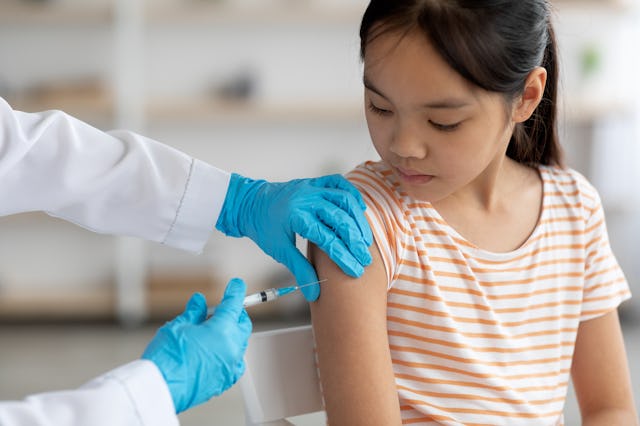Hold Up — Should My Kid Be Getting Two Flu Shots?
With a record-breaking flu season expected, the AAP suggests two flu jabs for some children.

We all know cold and flu season is coming — but it's time for one of those "in case you missed it" conversations about the upcoming cold and flu season. So, here's the deal: Australian citizens just experienced their worst flu season in five years, and global disease experts expect similar numbers this winter in America. During the height of the COVID pandemic, global distance and masking guidelines kept people from spreading the flu at quite the same rate as in seasons past. Now that those guidelines and restrictions are easing off (or going away entirely), it's causing a surge in cases of the flu. Meanwhile, there has also been a significant lag in child immunizations and vaccinations of all kinds during the pandemic. It's so worrisome that the American Academy of Pediatricians (AAP) is strongly recommending two flu shots for many young Americans.
This obviously begs a few big questions: Who needs two shots? Why? And is there a deadline? How you prepare for the upcoming flu season has a lot to do with what you did for your children last year.
Who should get their flu vaccinations?
Anyone 6 months and older can get a flu vaccine, and the AAP recommends they do so. While young children, the elderly, the immunocompromised, and people who work with the public are susceptible, the flu can strike anyone at any time. Since flu shots are available for nearly everyone, it continues to be recommended that everyone gets them.
When should you get your flu shot?
The CDC recommends you get your flu shot by the end of October, at the latest.
The common flu is most prevalent during colder months. Since late fall and through the winter are generally considered peak "flu season," it's important to be properly vaccinated by then. Since the flu shot is a yearly vaccine, you'd be safe to assume that the efficacy wears down over time. It takes about two weeks for your body to process the shot and form adequate antibodies, but getting a shot too soon could potentially leave you less protected at the tail-end of winter. The CDC says September and October are in the optimal range for getting flu shots.
Who needs two flu shots?
Not everyone. If your children are 9 years old or older, they'll be fine with one flu shot. However, the AAP is recommending two flu shots for children 8 years old and younger who:
- Have never received a flu shot before.
- Have only received one flu shot.
Unsure? Check with your child's pediatrician. They can look at each child's vaccination record and confirm if they've had more than one flu shot so far in their life and best gauge whether they would benefit from a second shot.
Flu Shot Timing
If you have a child needing two flu shots, you should keep a few factors in mind. First, remember that it takes two weeks for the flu vaccine to reach full efficacy. Next, remember that the CDC recommends we are fully vaccinated by the end of October. Finally, if your child qualifies for two shots, they need to be spaced a month apart. That means the optimal time for that first flu shot is now.
Common Flu Shot "Side Effects"
Many people claim that they "got the flu from the flu shot." That's simply not true. It's actually impossible, as there are no live flu germs within the vaccine.
However, some people do experience mildly adverse symptoms or side effects post flu shot. In many cases, those symptoms will look somewhat similar to the flu. Those side effects will be much milder and shorter-lasting than the flu. According to the CDC, "Common side effects from a flu shot include soreness, redness, and/or swelling where the shot was given, headache (low grade), fever, nausea, muscle aches, and fatigue."
Scheduling your flu shot on a Thursday or Friday would give you the weekend to recover.
It's worth noting that you can still get the flu even after you get the vaccine. According to the CDC, this most often happens to people exposed to the virus shortly before vaccination or those exposed to flu variants not covered in the current vaccine. People who get the flu vaccine will still experience more mild symptoms than the unvaccinated.